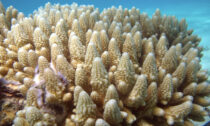
A new University of Wisconsin-Madison study has implications for predicting coral reef survival and developing mitigation strategies against having their bony skeletons weakened by ocean acidification. Though coral reefs make up less than one percent of the ocean floor, these ecosystems are among the most biodiverse on the planet – with over a million species estimated to be associated with reefs. The coral species that make up these reefs are known to be differently sensitive or resilient to ocean acidification – the result of increasing atmospheric carbon dioxide levels. But scientists are not sure why.
In the study, researchers show that the crystallization rate of coral skeletons differs across species and is correlated with their resilience to acidification.
“Many agencies keep...
Read More



Social Profiles